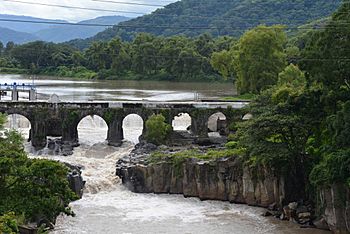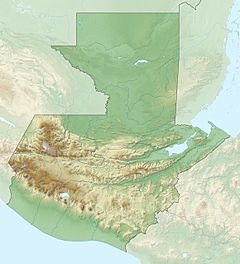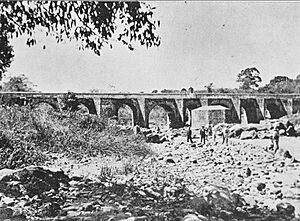Los Esclavos River facts for kids
Quick facts for kids Río Los Esclavos |
|
|---|---|

Bridge over Los Esclavos river
|
|
|
Location of mouth
|
|
| Country | Guatemala |
| Physical characteristics | |
| Main source | Mataquescuintla (Santa Rosa) 2,000 m (6,600 ft) 14°28′28″N 90°14′35″W / 14.47444°N 90.24306°W |
| River mouth | Laguna de Sipacate 0 m (0 ft) 13°50′20″N 90°19′46″W / 13.83889°N 90.32944°W |
| Length | 145 km (90 mi) |
| Basin features | |
| Basin size | Pacific |
The Río Los Esclavos is an important river in southern Guatemala. It starts high up in the mountains of the Santa Rosa area. From there, it flows past the town of Cuilapa. The river then crosses the flat coastal lands of Santa Rosa. Finally, it reaches the Laguna de Sipacate and flows into the Pacific Ocean.
The area of land that drains into the Los Esclavos river is called its basin. This river basin covers a large territory of about 2,271 square kilometres (877 sq mi).
Contents
The Famous Bridge
A very old and famous bridge crosses the Río Los Esclavos. This bridge was built a long time ago, during the time when Spain ruled Guatemala.
Building the Bridge
The idea for the bridge came from Baltazar de Orena and Governor Pedro Mayen de la Rueda in 1579. They wanted to build it because the river often became too high. This made it hard for people and goods to cross. The bridge was finished in 1592. Architects Francisco Tirado and Diego Felipe led its construction.
Why the Bridge Was Important
In those days, most goods came to Santiago de los Caballeros. This city was the capital. Goods arrived through the Acajutla harbor. The bridge made it much easier to transport these goods. It helped avoid problems when the river flooded.
Bridge Details and Repairs
The bridge is about 117 metres (128 yd) long and 16 metres (18 yd) wide. It stands on 11 strong arches. Over the years, the bridge needed some repairs. A famous local poet and leader, Francisco Antonio de Fuentes y Guzmán, was in charge of this work.
A Lasting Structure
Even after almost 500 years, the bridge is still standing. It has survived many challenges. These include strong river currents, earthquakes, and big storms. These events have damaged many other structures in Guatemala. But the Los Esclavos bridge remains a symbol of strong engineering from the past.
See also
 In Spanish: Río Los Esclavos para niños
In Spanish: Río Los Esclavos para niños



